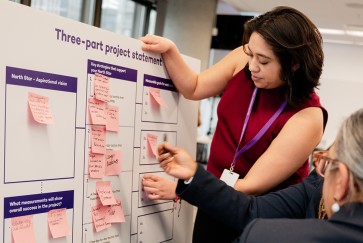The Office of the Provost has announced 11 spring recipients of the Provost Grants for Research in Humanities, Social Sciences and the Arts.
Faculty in the humanities, social sciences and the arts are eligible for grants awards, which are intended to provide funding in fields with little external or start-up funding.
This is the second grant cycle of the year. The provost’s office also awarded 13 faculty grants last winter, providing a total of $72,000 to assist faculty with non-travel-related research expenses.
Spring 2021 grant recipients
Eliza Bent, radio/television/film, School of Communication, for “PIED-A-TERRE-IA,” a virtual performance project, which is part comedy show, part live interview and part sprawling community check-in. Bent will explore this serious, difficult, baffling, painful moment in history, while also providing participants with an opportunity to process their feelings and experiences through laughter and togetherness.
Marcus Doshi, theatre, School of Communication, for “Towards Good Lighting for the Stage: Thoughts on Theory and Practice of Lighting Design for Live Performance,” a book about the aesthetic underpinnings of good lighting design for the stage and its articulation in production. The book will propose a way of thinking about lighting design that elevates it from its commonly understood position as a utilitarian vocation to that of an artistic practice, worthy of co-equal consideration in the collaborative process.
Harris Feinsod, English, Weinberg College of Arts and Sciences, for “Into Steam: The Worlds of Maritime Modernism,” a book project charting the conflicting stories of seaborne mobility as experienced by sailors, stokers and stevedores; by migrants and magnates; and by wharf rats and elite tourists. The study will be the first expansive history of maritime literary culture in the age of modernism.
Melissa Foster, theatre, School of Communication, for “THE MESSAGE: Hip-Hop History and Performance Technique Every Musical Theatre Performer Must Know,” a scholarly text which explores why hip-hop is ubiquitous in contemporary pop/rock musical theatre, and how to perform it with authenticity and appreciation for the original origins of the music.
Laurel Harbridge-Yong, political science, Weinberg College of Arts and Sciences, for “The Polarizing Effects of Primaries,” a project that will study how voters respond in general and primary elections, in order to understand whether the gain from siding with primary voters outweighs the potential costs legislators face in the general election, and legislators’ electoral incentives when the primary and general electorates take different positions on the same issue.
Ana Kuzmanic, theatre, School of Communication, for “Virtual Space and 3D Output in Creative Partnership,” a project using software and 3D printing to explore the creative process of an artist, as they move back and forth between the digital space and 3D printed output in costume design.
Sam Meekings, liberal arts program, NU-Q, for “Barriers to Beginning: Local, Cultural and Colonial Impediments to Creative Writing in Qatar,” a research project addressing the barriers (culturally, locally and interms of colonial conceptions of craft) that impede student-writers in Qatar from writing. The project will examine local student writers’ practices and how they approach creative writing (including thinking about the influence of online writing communities, current lore and popular advice).
Stephen Nelson, political science, Weinberg College of Arts and Sciences, for “Best Laid Plans: The Political History of Economic Development Plans, 1950-2000,” a project to understand what kinds of priorities animated the economic development plans produced by developing countries in the years after decolonization and under what political and economic conditions national development plans could succeed. The project uses a large-scale computerized text analysis of hundreds of thousands of pages of national development plans from over 150 countries.
Eric Patrick, radio/television/film, School of Communication, for “Elevated Loop,” an animated journey on the Chicago “El” train’s Red Line between Howard and Belmont, which aspires to expand the language of both nonfiction and documentary film by creating an animated ethnography.
J.P. Sniadecki, radio/television/film, School of Communication, for “Cairo, IL,” ethnographic research of the formation of the first media arts center in Cairo, Ill., — and efforts to create a community archive of video, film, photos and text. The project seeks to interrogate the politics of traditional documentary and ethnographic representation, and question conventional power divisions between filmmaker and film participant, and researcher and research subject, with the aim to be empowering and generative for — rather than extractive from — the community of Cairo.
Masaya Yoshida, linguistics, Weinberg College of Arts and Sciences, for “Grammatical Structure and Language Understanding,” a research project on the role of grammatical structures in language understanding. The project explores whether the act of building the abstract and complex grammatical structure of sentences itself results in the speed and accuracy of language processing.

